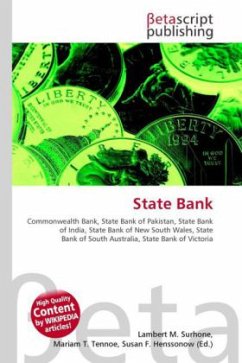Please note that the content of this book primarily consists of articles available from Wikipedia or other free sources online. A state bank is generally a financial institution that is chartered by a state. It differs from a reserve bank in that it does not necessarily control monetary policy (indeed, the state in question may have no legal capacity to create monetary policy), but instead usually offers only retail and commercial services.In the United States the term state bank is used in contradistinction to "national bank." All national banks are chartered and regulated by the Office of the Comptroller of the Currency. State banks are chartered and regulated by a state agency (often called the Department of Financial Institutions) in the state in which its headquarters are located. In addition, state banks that are members of the Federal Reserve are regulated by the Federal Reserve; state banks that are not members of the Federal Reserve are regulated by the FDIC. Therefore, almost every state bank has both a state and federal regulator. There are a handful of state banks which do not have FDIC insurance.
Bitte wählen Sie Ihr Anliegen aus.
Rechnungen
Retourenschein anfordern
Bestellstatus
Storno








